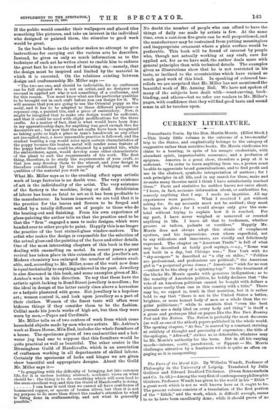CURRENT LITERATURE.
Transatlantic Traits. By the Hon. Martin Morris. (Elliot Stock.) —This lively little volume is the outcome of a two-months' trip to the States, and emphatically belongs to the category of suggestive rather than nutritive books. Mr. Morris vindicates his claim to a hearing, in spite of his meagre credentials, with abundant spirit, imperturbable assurance, and a profusion of epigram. America is a great show, therefore a peep at it is sufficient. "In order to learn anything from me, a person must be able to appreciate broad generalisations, and to find profit and use in the abstract, symbolic interpretation of matters ; for I seek principles in all life, and in my search for them, make and re-make many theories until I think I have satisfactorily reached them." Facts and statistics he neither knows nor cares about. "I have, in fact, accurate information about, or authorities for, scarcely anything that I say. I made no inquiries. All my experiences were passive. What I received I got without asking for. So my accounts must not be audited; they must be taken in glob° ; for I would always only give the sum- total without trying to explain how it is reached. For my part, I have never weighed or measured or counted anything in life. I leave all that to tradesmen, whether grocers or tailors, pedants or versifiers." Happily Mr. Morris does not always adopt this strain of complacent egotism, and hie impressions, even where superficial, not to say ridiculous and inaccurate, are vividly and felicitously expressed. The chapter on "American Traits" is full of what may be described as fairly good sayings, — e.g., "Rome was not built in a day, but Chicago was ; " New York with its " sky-scrapers " is described as "a city on stilts ; " "Politics are professional, and professions are political ;" the American girl is "a perpetual prima donna ; " Americans "wish for no rest —unless it be the sleep of a spinning-top." On the treatment of the blacks Mr. Morris speaks with generous indignation; as to the venality of American politics, he boldly declares that "the vote of an American politician cannot be bought with dollars a whit more easily than one in this country with a title." There may be, we expect is, truth in that assertion, but it is rather bold to say that "there is not in the United States a better, brighter, or more honest body of men as a whole than the re- gular politicians ; " while to maintain that "even the best journals are a daily libel on every body and thing" is itself a a gross and grotesque libel on papers like the New York Evening Post and the Nation. The Nation is probably the most decorous (as well as one of the ablest) papers published in the whole world. The opening chapter, "At Sea," is marred by a constant striving at subtlety of thought and preciosity of expression ; the title of the epilogue, " Aftword," strikes us as detestable, whatever may be Mr. Morris's authority for the term. But in all his varying moods—intense, exalte, paradoxical, or flippant — Mr. Morris challenges attention by a frankness which is quite as often en gaging as it is exasperating.


















































 Previous page
Previous page